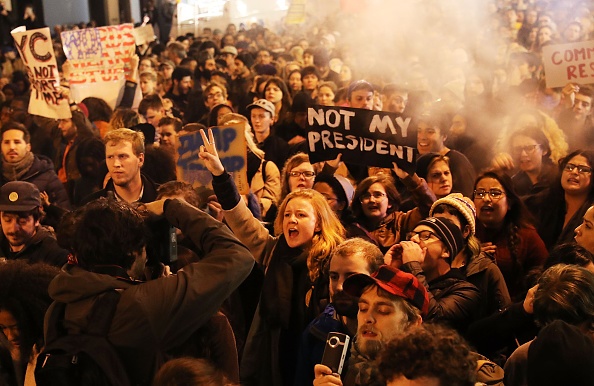Reconciliation requires sacrifice; it is costly and is humbling. But it is the only way to construct the identity of a nation that fosters peace, generosity and prosperity.
 Anti-Donald Trump protesters in New York after the election. / Getty
Anti-Donald Trump protesters in New York after the election. / Getty
I’m not sure whether to feel relieved or fearful about the outcome of the US elections. I just returned from almost 4 weeks in the US, and have had many conversations about the elections. Everybody was deeply concerned about the future of the country, for various reasons.
Nobody I talked to liked either candidate. I learned quickly in these conversations that I do best to simply listen, because emotions run high and sober discussion is challenging. Sometimes even families are seriously divided over this election.
Most of my friends are evangelical and Republican, and they were surprised when I told them that many in the Netherlands favor Clinton. Not that my friends like Trump – quite the opposite – but to them Clinton is an even worse nightmare. They spoke in apocalyptic terms in case Clinton should be elected – as Clinton supporters do about Trump’s election. What strikes me is the level of fear and suspicion towards the 'other' candidate – it is nearly tangible. Each side magnifies the deficiencies of the ‘other’ candidate and minimizes the deficiencies on one’s own side. The ‘character assassination’ committed by both campaigns didn’t help the matter any.
In the end, my friends voted for Trump (I think) because they feared Clinton more than Trump.
I found out that many people pay hundreds of dollars per month extra for ObamaCare compared to the insurance they used to have. My friends are passionately concerned about Christian values like marriage and sanctity of life, values that Clinton would trounce upon by the Supreme Court judges she would appoint. Many of my friends work much harder than most Europeans, often past their retirement date, to pay off their mortgages and have a reasonable pension, while those who immigrated to the US have faced very difficult and expensive procedures to get their papers; Clinton would take their money in higher taxes and spend it on illegal immigrants who have not complied with the regulations. Can you sense their fear and outrage at what Clinton might do to the country, how she would encroach on their livelihood and families? So no, I am not terribly surprised by Trump’s election.
What I find fascinating about this is the identity dynamics. Each party magnifies the faults of the other, while barely acknowledging their own – a typical feature of identity dynamics. Elections demand that you highlight and exaggerate about all that is good about yourself and your group. One of the easiest ways of doing this is tarnishing the ‘other’, vilifying the outgroup, slinging mud at the other camp. This mostly affirms the loyalty within your own group, for the other camp is outraged, not convinced. Instead, the other camp minimizes all charges, and slings mud in return – again strengthening the loyalty within their own group, a loyalty built on outrage and anger, but hardly convincing the ‘other’.
The apostle Paul once complained that one of his churches was just as divided: “I follow Paul, I follow Apollos, I follow Peter” (1 Cor. 1:12). Interestingly, Paul never denied the unique value that Apollos, Peter and he himself contributed to this church, but he wanted to incorporate these smaller group identities in a more encompassing sense of identity: through baptism, the cross of Christ unites them all. Later, he speaks of a ministry of reconciliation (2 Cor 5:17-20) as the core practice that constitutes the identity of his churches.[1]
I am deeply concerned that our political leaders, in the US, in Europe, and across the world, understand their task in identity construction. It appears easy to lead by dividing, highlighting ‘my group’ and demonizing everyone else. But in the end it is destructive, because it is built on outrage and anger.
Will Trump and many other leaders like him rise above their tactics to appeal to fear and to build anger, dividing people as a way of mobilizing them?
Will political as well as religious leaders focus on building identities of reconciliation where subgroup identities are respected and even celebrated, even while they are valued as part of a larger whole?
Reconciliation requires sacrifice; it is costly and is humbling. But it is the only way to construct the identity of a nation that fosters peace, generosity and prosperity.
Jack Barentsen, Ph.D., Associate Professor and Chair of Practical Theology; Researcher Institute for Leadership and Social Ethics. Evangelische Theologische Faculteit, Leuven
[1] See also my extensive study: Barentsen, J. (2011). Emerging Leadership in the Pauline Mission: A Social Identity Perspective on Local Leadership Development in Corinth and Ephesus. Eugene: Wipf & Stock.

Las opiniones vertidas por nuestros colaboradores se realizan a nivel personal, pudiendo coincidir o no con la postura de la dirección de Protestante Digital.
Si quieres comentar o